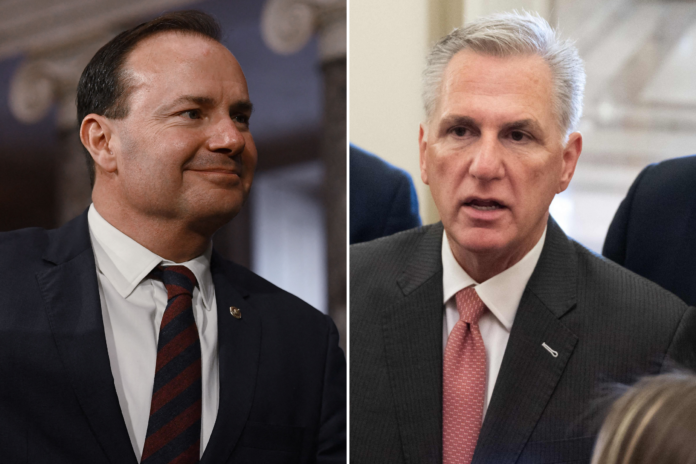Through weeks of high-level discussions on the debt ceiling, House Speaker Kevin McCarthy’s control over the Republican conference has arguably been his greatest strength.
After 15 rounds of voting to become speaker this year—a point he has emphasized regularly throughout discussions with reporters this month—McCarthy has demonstrated a firm command of his narrow majority in the House, not yielding an inch in negotiations, even as the federal government hurdles toward defaulting on its debts as early as next week.
But the House is the House; the Senate is the Senate. And unlike McCarthy’s conference, Senate Republicans might not be willing to follow along with whatever deal he ultimately strikes as the balance of Biden’s majority there remains in question.
Olivier Douliery/Saul Loeb/Newsweek Photo Illustration/Getty Images
On Thursday, Utah Senator Mike Lee signaled he might not be willing to accept a McCarthy-brokered compromise if the reductions in spending he’d requested were not as substantial as deficit hawks in both chambers originally sought—throwing a wrinkle in any deal’s prospects in the narrowly Democratic-controlled Senate.
“I will use every procedural tool at my disposal to impede a debt-ceiling deal that doesn’t contain substantial spending and budgetary reforms,” Lee wrote on Twitter. “I fear things are moving in that direction. If they do, that proposal will not face smooth sailing in the Senate.”
I will use every procedural tool at my disposal to impede a debt-ceiling deal that doesn’t contain substantial spending and budgetary reforms. I fear things are moving in that direction. If they do, that proposal will not face smooth sailing in the Senate.
— Mike Lee (@BasedMikeLee) May 25, 2023
Newsweek reached out to McCarthy’s office via email for comment.
It’s currently unclear what Lee’s concerns are. On Thursday, House Republicans indicated they would be leaving town prior to any deal being struck and—at this juncture in the negotiations—neither side has yielded much of anything.
In guidelines released this week, Republicans ruled out the possibility of new tax revenues, military spending cuts, and Social Security and Medicare cuts. However, they have stayed steadfast in pushing for work requirements for those receiving those social services, a policy considered a red line for Democrats.
But some Democrats have refused to accept any of Republican-proposed, broad-based cuts to discretionary spending, which they say will have detrimental impacts on health care and human services for the nation’s most vulnerable citizens at a time when the Biden administration has argued that its plan will meaningfully cut the federal debt.
In return, Republicans have expressed a willingness to play brinkmanship with the federal debt ceiling, potentially putting the United States at risk of defaulting on its debts and crashing the world economy.
Some Democrats have also flirted with the prospect of Biden invoking his authority under the 14th Amendment of the U.S. Constitution to override Congress. It’s unclear whether Biden would take that step, however, given his long-standing deference to the legislative branch and the likelihood of a potential fight with the U.S. Supreme Court.
However, on Thursday, the Associated Press reported that Republicans are potentially easing their request to increase national defense spending in return for reductions in funding for the Internal Revenue Service’s tax compliance division, which Biden has pursued in efforts to increase tax revenues from the country’s wealthiest taxpayers.
But McCarthy’s red line is simple. Any deal, he said this week, must “spend less than we spent last year.”


